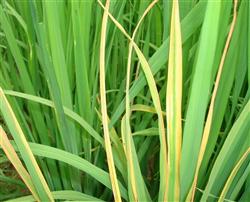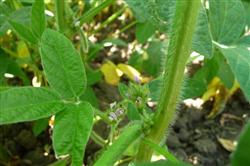Prevention and control of rice diseases and insect pests: what if it is difficult to heading rice?

What if it is difficult for rice to heading? What causes the difficulty in heading of rice? Please guide the reason for the difficulty of rice heading: it is difficult for rice to heading, or the phenomenon of neck wrapping appears. The rice grains wrapped in the leaf sheath will generally become empty grains because they cannot be pollinated and fertilized in time, which has a great impact on the yield. There are many reasons for this phenomenon, some varieties have serious neck-wrapping phenomenon, which is more serious in adverse environmental conditions, some are improper application, such as excessive application of triadimefon before heading, it is easy to appear neck-wrapping phenomenon, the application of herbicides such as Weiba, Puma and other herbicides affect the growth of rice, and heading difficulties will also occur. Adverse environmental conditions such as low temperature at heading stage will also lead to the phenomenon of rice neck wrapping. The solution to the difficulty of rice heading is that it is difficult for rice to heading at the heading stage. Spraying gibberellin can promote heading, make the spike out in time within 2-3 days, and pollinate normally, which can effectively reduce the empty grain rate in the lower part of the panicle. Generally use 1-2 grams per mu of 920 (gibberellin preparation) plus 50-60 kg of water spray. If rice heading difficulties occur in the field, pay attention to spraying only these pieces, and try not to spray plants with normal heading, so as not to pull out the last section of these rice plants too long. Spot spray should control the dosage according to the actual spraying area to avoid excessive dosage in the local area. In addition, combined with spraying Chunquan series of foliar fertilizers, 0.1% sodium humate, 1.5% potassium chloride, 2% urea solution, etc., can enhance the photosynthetic function of leaves and improve the seed setting rate. Click to get more rice planting techniques click to get more food crop planting techniques
- Prev

Prevention and control of rice diseases and insect pests: what medicine is good for rice bacterial blight?
What medicine is good for rice bacterial blight? What are the hazards of rice bacterial blight? What are the causes of rice bacterial blight? Please introduce that bacterial blight is one of the main diseases of rice. Once it occurs, the yield can be reduced by 10%, and in severe cases, it can be reduced by 50-60%. Therefore, it is very important to strengthen the prevention and control of bacterial blight.
- Next

Soybean cultivation: how to manage the flowering and podding period of soybean?
How to manage the flowering and podding period of soybean? Please introduce the method of soybean flowering and podding period, mainly to strive for more flowers, early flowers, full flowers, and to prevent flowers and pods from falling off and increasing flowers and pods, which is the central task of management in this period. It depends on seedling management, the combination of protection and control, high-yield fields to control mainly, to avoid premature ridge closure, to achieve at the end of flowering.
Related
- The first cup of black tea in spring, the flavor and history of tea gardens in Kenya, Africa
- The computer can not only choose potatoes, but also grow tea rice. AI will grow winter oolong tea champion.
- It is not only the inflated tea bitten by insects, but also engraved with the four seasons tea in Beipu.
- The Oriental Beauty Tea Festival in Zhuxian County takes the stage at the weekend to experience the plus-size feast of oil tea.
- & quot; Oriental Beauty Tea & Exploration of Emei in Hsinchu, the hometown of quot;
- The new variety of strawberry "Tainong 1" dessert is the first choice with mellow aroma. Crimson gorgeous
- History of Tea in Taiwan: from Wild Inner Mountain to Export Tea Garden
- Two types of Taiwan Oriental Beauty Black Tea won the British three-Star Award for Childhood Tea Xiang Zhang Jiaqi changed from pilot to champion tea maker.
- Banana species and varieties: the planting history of Taiwan Xianren banana and dwarf banana is long, is banana disease resistant?
- Coffee planting Technology: Qianjie Coffee from Seedling to harvesting

